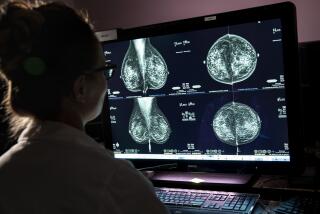Breast Self-Examinations May Do More Harm Than Good
- Share via
Monthly self-examination of their breasts by women does not reduce the number of deaths from breast cancer and may, in fact, harm women by producing excessive numbers of biopsies, a new study has found.
In a controversial new report by the Canadian Task Force on Preventive Health Care, researchers called for doctors to stop teaching the technique to their patients and to rely instead on mammograms and breast inspections by trained professionals.
Dr. Nancy Baxter of the University of Toronto and her colleagues reviewed the results from several large trials of breast self-examination, especially randomized trials in China and Russia. They reported in the June 26 Canadian Medical Association Journal that the studies found no reduced death rate among women, ages 40 to 69, performing self-examinations. But there were significant increases in the number of physician visits for evaluation of benign breast lesions and significantly higher rates of benign biopsy results.
“Women do find lumps and do find breast cancers themselves,” Baxter said. But “most are not found during breast self-examination.”
Critics charge, however, that the Chinese and Russian studies have only run for five years so far--not a long enough time to determine the efficacy of the procedure. Had studies of mammography stopped after five years, said Dr. Suzanne Fletcher of Harvard Medical School, they would have concluded that it is not effective either.
Said a spokeswoman for the American Cancer Society: “We feel that there is a value in doing a breast self-examination and continue to feel that way. Women who examine their breasts regularly become very sensitive to changes in the breast tissue and are more likely to find cancers when they are smaller” and thus more readily treatable.
Cranberry Juice Benefits Are Confirmed
A new Finnish study confirms that drinking cranberry juice can reduce the recurrence of urinary tract infections in women.
Earlier studies had suggested its effectiveness, but a recent review concluded that the results were inconclusive. About 60% of women suffer a urinary tract infection at some point and about one-third of them suffer a recurrence within a year.
Dr. Tero Kontiokari and colleagues at the University of Oulu in Finland studied 150 women with existing urinary tract infections. A third received cranberry juice daily, a third received a commercial supplement containing lactobacillus that is thought to reduce urinary tract infections, and a third received nothing.
The team reported in the June 30 British Medical Journal that only 16% of the women in the cranberry juice group had a recurrence of infection over a six-month period, compared with 39% of those in the lactobacillus group and 36% in the control group.
Number of Heart, Cancer Deaths Decreases
The number of Americans dying of heart disease, cancer, AIDS, homicide, suicide and stroke all declined in 1999, researchers from the Centers for Disease Control and Prevention reported last week. But deaths attributable to high blood pressure, diabetes, respiratory disease and blood infections climbed.
Overall, the report said, 2,391,630 people died in the United States, an increase of 54,374 over the previous year. But the average life expectancy (76.7 years) and the infant mortality rate (7.1%) remained constant.
For the first time, deaths related to a wide range of dementias were classified as deaths resulting from Alzheimer’s disease in order to yield a better estimate of the prevalence of the disorder. That pushed Alzheimer’s to No. 8 on the list of top causes of death, up from 12th the year before. The authors said that the rising number of those deaths, as well as deaths from respiratory diseases and blood infections, reflected the aging of the American population.
Key Component in Vegetables Identified
Scottish researchers have found another way--perhaps the most important way--that fruits and vegetables help prevent heart disease and bowel cancer.
The effect, they say, could be due to high levels of salicylic acid in the food. Salicylic acid is the main ingredient in aspirin, which is widely taken to prevent heart disease.
Chemical pathologist John Paterson and his colleagues at the Dumfries and Galloway Royal Infirmary in Dumfries devised a way to measure salicylic acid in blood samples, then compared levels in 37 vegetarian Buddhist monks, 39 meat and fish eaters and 14 diabetics taking low-dose aspirin.
They reported in the July Journal of Clinical Pathology that salicylic acid levels were 12 times higher in vegetarians than in the meat-and fish-eaters and higher still in the group taking aspirin.
Paterson said that other compounds in the fruits and vegetables may play a role in their protective effects, but that salicylic acid is the only one that has definitely been proved to be beneficial.
Drug’s Value for Preemies Is Reassessed
Premature infants with extremely low birth weights are routinely given the drug indomethacin to prevent bleeding in the brain and a heart condition called patent ductus arteriosus, an abnormal opening between two arteries.
The drug is effective for those specific purposes but, surprisingly, it doesn’t improve the rate of survival without blindness, deafness, cerebral palsy or learning defects, according to an international study.
A team led by Dr. Barbara Schmidt of McMaster University in Hamilton, Canada, studied 1,202 infants with birth weights between 1 pound and 2.2 pounds. Half were given indomethacin and half a placebo.
The team reported in the June 28 New England Journal of Medicine that 47% of those given indomethacin died or survived with a significant neurosensory impairment, compared with 46% of those given a placebo.
“People assumed that the short-term benefit would translate into long-term benefits,” Schmidt said. “There isn’t even a hint in our data that that can be accomplished. It’s been raising false hopes.”
The team concluded that the drug should be used in the 13% of cases where there is bleeding in the brain or when there is patent ductus arteriosus, but that it should not be used in routine cases.
*
Medical writer Thomas H. Maugh II can be reached at thomas.maugh@latimes.com.






